This article includes content provided by Facebook. We ask for your permission before anything is loaded, as they may be using cookies and other technologies. To view this content, click 'Allow and continue'.
London’s Borough Market is to introduce free drinking water fountains as part of a new pledge to phase out sales of all single-use plastic bottles over the next six months.
The renowned foodie haven – the only fully independent market in the capital – is aiming to become the UK’s biggest food shopping destination that is entirely plastic-free.
The market aims to make all other packaging used by its 114 traders over the 51,272 sq ft site near London Bridge biodegradable and compostable, helping it to achieve zero waste to landfill. Its overall mission is to put every leftover piece of food or packaging to the best possible use.
The market will also announce it is phasing out the sale of water in single-use plastic bottles – for sale at the market as well as in cafes and chains on its fringes – and offering free drinking water from newly installed fountains instead.
A recent Guardian campaign revealed that 38.5m plastic bottles are bought in the UK every day, of which just over half are recycled. At the same time, 16m are put into landfill, burned or otherwise leak into the environment and oceans each day. Plastic bottles can take up to 450 years to break down once they reach the sea.
“It’s great that people are increasingly aware of the health benefits of keeping hydrated, but we’ve been troubled to see increasing numbers of plastic bottles used every day, which damage the environment and add to litter,” said Darren Henaghan, managing director of Borough Market.
“By using the new Borough fountains our visitors will be able to refill and refresh without having to buy a plastic bottle each time. We are proud to take this significant step forward as part of our ongoing commitment to making Borough Market Britain’s greenest place to shop and hope that others will follow suit.”
The fountains placed around the market will mean that visitors are never more than a short walk away from free drinking water. Each has two streams of water to drink from and one to refill reusable water bottles. Plans are currently in place to produce Borough Market refillable bottles made from recycled plastic that can be purchased from stalls around the market.
Borough Market is known as the hub of London’s world-class food scene although its history goes back centuries. In June it resumed trading 11 days after three men mounted an attack in and around the market’s bars and restaurants which killed eight people.
Thousands of tourists flow through the market every day, sampling gourmet food from the UK and around the globe at more than 100 shops, stalls and restaurants, alongside a handful of traditional market traders still selling fruit and veg.
The amount of waste from single-use plastic bottles in London has risen out of control, according to a recent report from the London assembly environment committee. It is calling on the mayor to consider introducing a deposit return scheme and provide free tap water as an alternative.
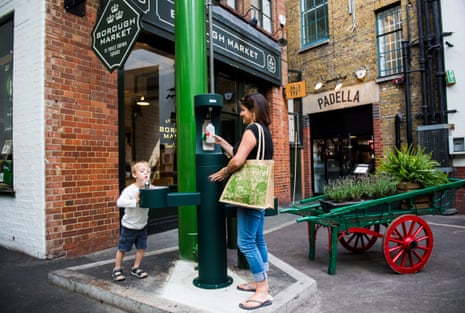
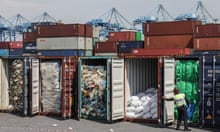
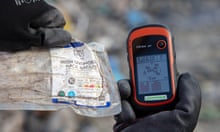
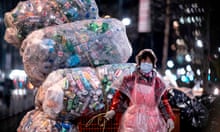
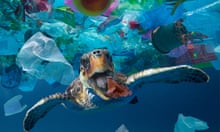



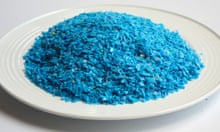


Comments (…)
Sign in or create your Guardian account to join the discussion